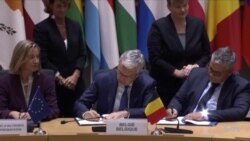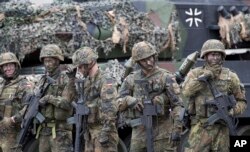Twenty-three member states of the European Union have signed a historic deal to cooperate more closely on defense. The pact, known as Permanent Structured Cooperation or PESCO, legally binds its signatories into joint defense projects as well as pledging to increase defense spending and contribute to rapid deployments.
The pact includes all EU governments except Britain, which is due to leave the bloc in 2019, Denmark, Ireland, Portugal and Malta.
It is backed by a $5.8 billion fund for buying weapons, plus extra cash for operations and money from the EU budget for defense research. Leaders hailed the agreement as a historic milestone for the EU.
“I have to say that I was looking at you all signing something that just one year ago most of us and most of the rest of the world considered impossible to achieve. So I am receiving this notification with a lot of satisfaction, but also a lot of sense of responsibility. This is the beginning of our common work,” said the EU Foreign Affairs Policy Chief Federica Mogherini at a signing ceremony Monday in Brussels.
Supporters say the pact will end the kind of shortcomings seen in the 2011 intervention in Libya, when European allies relied on the United States for air power and munitions.
Three years later, Russia’s invasion of Crimea persuaded many European leaders of the need for closer defense.
“It has failed in the past. There is a window of opportunity now that they have seized on, led by predominantly Germany and France, to build this group of 23 who want to integrate more closely,” says Sophia Besch, security and defense analyst at the London-based Center for European Reform.
Edged on
That window of opportunity has opened thanks to political forces further afield, foremost among them the election of Donald Trump as U.S. President in 2016. On the campaign trail, he called NATO "obsolete" and demanded allies do more for their own defense. Though he has since offered support for the alliance, doubts linger in Brussels.
“The strong sense in Europe that America will no longer be there to rescue them, and that they have to get serious, that they have to grow up on defense themselves. Then secondly, we’ve had Brexit. The U.K. has always been critical of European defense integration on the EU level,” says Besch.
Britain is due to leave the EU in 2019. Its foreign secretary, Boris Johnson, pledged to support the EU pact Monday, telling reporters, “We think there's a lot of promise in the ideas, and we'll be backing them up.”
The PESCO pact aims to increase European security cooperation below the level of collective defense, which is covered by Article 5 of NATO, according to analyst Besch.
“NATO representatives are saying that they actually don’t see the risk of duplication, that they don’t see the risk of redundancy. They do see the need for European countries to spend more on defense and work more closely together there.”
Analysts say Britain fears being squeezed out between NATO and the European Union. Brussels has indicated Britain may be able to join EU projects under PESCO, but only if it provides substantial funds and expertise.






